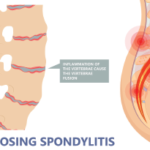EULAR 2022—On Oct. 21, the U.S. Food & Drug Administration (FDA) approved upadacitinib, a Janus kinase (JAK) inhibitor, for the treatment of adults with active non-radiographic axial spondyloarthritis (nr-axSpA) with objective signs of inflammation who have had an inadequate response, or demonstrated intolerance, to tumor necrosis factor (TNF) inhibitor therapy. The drug is also FDA approved for the treatment of patients with rheumatoid arthritis, psoriatic arthritis, ankylosing spondylitis (AS), atopic dermatitis and ulcerative colitis.1,2
Upadacitinib and other JAK inhibitors carry an FDA boxed warning with information about the risks of serious heart-related events, cancer (e.g., lymphoma, lung cancer), blood clots and death. An increased risk of serious bacterial, fungal, viral and opportunistic infections leading to hospitalization or death, including tuberculosis (TB), exists for patients taking JAK inhibitors. All patients should be tested and monitored for latent TB before and during treatment, and latent TB should be treated prior to use. Patients 50 or older with at least one risk factor for heart disease who are treated with JAK inhibitors have an increased risk of death compared with those treated with TNF inhibitors.1
JAKs are intracellular enzymes that transmit signals from cytokine or growth factor-receptor interactions on the cellular membrane to influence cellular processes of hematopoiesis and immune cell function. Upadacitinib modulates the signaling pathway at the points of JAKs, with a greater inhibitory potency at JAK1 and JAK2.
JAK inhibitors have been recognized as a possible treatment for radiographic axial spondyloarthritis (axSpA), also known as AS. In early 2022, upadacitinib was approved to treat this condition. To date, few studies have been conducted on JAK inhibitors for the management of nr-axSpA. However, during EULAR 2022, Atul Deodhar, MD, MRCP, professor of medicine, Division of Arthritis and Rheumatic Diseases, School of Medicine, Oregon Health & Science University, Portland, presented findings from a phase 3 safety and efficacy study of upadacitinib for patients with active nr-axSpA.3
The Research
SELECT-AXIS 2 (NCT04169373) represents two studies with randomization, data collection, analysis and reporting conducted independently.4,5 The first study was in patients with AS who had an inadequate response to biologic disease-modifying anti-rheumatic drugs (DMARDs).
The second part of SELECT-AXIS 2 was a double-blind, placebo-controlled study of patients with nr-axSpA conducted by Deodhar et al.3,5 In this phase 3 study, which was used as the basis of the FDA’s approval of upadacitinib for nr-axSpA, adults with nr-axSpA were randomized in a 1:1 ratio to receive 15 mg of oral upadacitinib or placebo once daily over 52 weeks. Enrolled patients met the 2009 Assessment of SpondyloArthritis International Society (ASAS) classification criteria for axSpA, but not the radiologic criteria of the modified New York criteria. At screening, patients had to have objective signs of active inflammation consistent with axSpA on magnetic resonance imaging MRI of the sacroiliac joints and/or a high sensitivity C-reactive protein (hsCRP) level greater than the upper limit of normal (2.87 mg/L). Also, patients had to have a Bath Ankylosing Spondylitis Disease Activity Index (BASDAI) and total back pain scores of at least 4 (based on a 0–10 numeric rating scale) as assessed by the patients.
The primary end point was the ASAS40 response at week 14. ASAS40 is defined as a 40% or more improvement and an absolute improvement of two or more units (on a scale of 0 to 10; 0=no pain and 10=worst possible pain) from baseline in at least three of four domains (i.e., patient global assessment, back pain, function and inflammation) with no worsening at all in the remaining domain.
The study assessed multiple secondary end points, including the change from baseline in Ankylosing Spondylitis Disease Activity Score (ASDAS), which is a composite index with proven validity and reliability to assess disease activity. It combines five disease activity variables: back pain, duration of morning stiffness, patient’s global assessment, peripheral pain and swelling, and hsCRP or erythrocyte sedimentation rate. In the study, a BASDAI 50 response is defined as at least a 50% improvement from baseline in the BASDAI, commonly used to define disease activity levels in axSpA patients. It consists of a 1 (no problem) through 10 (worst problem) scale and is used to answer six questions pertaining to the five major symptoms of AS: fatigue, spinal pain, joint pain/swelling, areas of localized tenderness, morning stiffness duration and morning stiffness severity.
Treatment-emergent adverse events were also reported through week 14.
In a short-term study, upadacitinib improved the pain, function & other signs & symptoms of non-radiographic axial spondyloarthritis (nr-axSpA) in patients with active disease, compared with placebo.
The Results
The study randomized 314 patients with active nr-axSpA. Of these patients, 313 received medication: 156 patients received upadacitinib and 157 patients received placebo. Ninety-four percent of patients (n=295) received medication through week 14 (i.e., 145 patients in the upadacitinib group and 150 patients in the placebo group). Baseline demographic and disease characteristics were similar across the treatment groups and were consistent with that of patients with active nr-axSpA population. Patients were 58% female, with a mean age of 42.1 years, a mean BASDAI of 6.9 and a mean hsCRP of 12.1 mg/L.
At week 14, a significantly higher ASAS40 response was achieved by patients treated with upadacitinib (45%; 70 of 156 patients) compared with placebo (23%; 35 of 157, P<0.0001). Twelve of the 14 secondary end points met statistical significance at week 14 for patients who received upadacitinib, compared with patients who received placebo (P<0.01). These secondary end points included:
- The change from baseline in ASDAS, C-reactive protein, Spondyloarthritis Research Consortium of Canada (SPARCC) MRI sacroiliac joint, total back pain, nocturnal back pain, Bath Ankylosing Spondylitis Functional Index (BASFI), Ankylosing Spondylitis Quality of Life (ASQoL), ASAS Health Index; and
- The percentage of patients who achieved responses for BASDAI50, ASDAS inactive disease, ASDAS low disease activity, ASAS partial remission and ASAS20.
Treatment-emergent adverse events were similar between the two groups and occurred in about 47% of patients. Serious adverse events and adverse events leading to discontinuation of the study drug occurred in four patients (3%) who received upadacitinib and two patients (1%) who received placebo. Few patients in both groups had serious infections or herpes zoster. Five patients (3%) who received upadacitinib had neutropenia, whereas no patients who received placebo had neutropenia. No opportunistic infections, malignancies, major adverse cardiovascular events, venous thromboembolic events or deaths were reported in patients who received upadacitinib. One case of basal cell carcinoma occurred in a patient who received placebo.
In this short-duration study, treatment with upadacitinib significantly improved the signs and symptoms of nr-axSpA, such as disease activity, pain, function, quality of life and MRI-detected sacroiliac joint inflammation, compared with placebo. The upadacitinib safety profile did not identify any new risks. This study supports using upadacitinib in the management of patients with active nr-axSpA, subsequently leading to its FDA approval in October 2022.
Michele B. Kaufman, PharmD, BCGP, is a freelance medical writer based in New York City and a pharmacist at New York Presbyterian Lower Manhattan Hospital.
References
- News release: Rinvoq (upadacitinib) receives its sixth U.S. FDA approval. 2022 Oct. 21.
- Highlights of prescribing. Rinvoq (upadacitinib). U.S. Food & Drug Administration. 2019 Aug.
- Deodhar A, Van den Bosch F, Poddubnyy D, et al. Efficacy and safety of upadacitinib in patients with active non-radiographic axial spondyloarthritis: A double-blind, randomized, placebo-controlled phase 3 trial (OP0016). Ann Rheum Dis. 2022 Jul; 81(suppl 1):9.
- A study to evaluate efficacy and safety of upadacitinib in adult participants with axial spondyloarthritis (SELECT AXIS 2). ClinicalTrials.gov. 2021 Oct 26.
- Deodhar A, Van den Bosch F, Poddubnyy D, et al. Upadacitinib for the treatment of active non-radiographic axial spondyloarthritis (SELECT-AXIS 2): A randomised, double-blind, placebo-controlled, phase 3 trial. Lancet. 2022 Jul 30;400(10349):369–379.



